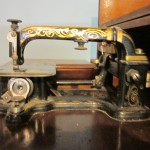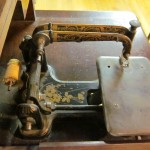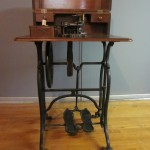- View from right side of sewing machine
- Side view of 1867 Wheeler & Wilson sewing machine
- Sewing machine cabinet…notice the foot pedals
At the time Delphos came into existence, most families didn’t have money to spend on store-bought clothing and linens, but had to depend on their own expertise with a needle and some thread to make such items for their households. It was a very tedious and time-consuming chore. But that all changed with the invention of the sewing machine by Elias Howe in 1846. Right on his heels was Isaac Singer, who developed a sewing machine for home use; but it was a little-known third inventor, Allen Wilson, who fine-tuned it into the smooth-working machine such as we know today. Wilson was an inventor, but he was no businessman, so he teamed up with Nathaniel Wheeler, and during the 1850’s and 1860’s, The Wheeler & Wilson Company was the most successful sewing machine producer in the world. Theirs was the best sewing machine money could buy, but their glory did not last.
Although sewing-machine prices dropped after the Civil War, a machine was still a sizeable investment. Sometimes neighboring families pooled their money to share a machine. To increase the market, Singer began making cheaper models and came up with the “hire-purchase plan”, which was the prototype for making installment payments. With this plan, the Singer sewing machine was made available to just about anyone—even those with very limited incomes. Also, by the late 1870’s all the patents had been extended and exhausted and Wheeler & Wilson production fell dramatically as competition from new manufacturers increased. In 1904 they were bought out by Singer.
The canal museum is very fortunate to have one of the first Wheeler and Wilson models made during that prosperous time. It is very unusual because the material feeds from left to right rather than front to back. The machine pictured here was made around 1867 and donated by Arthur and Gayle Ladd.
Locally, an 1899 Delphos Herald had ads for sewing machines at Mueller’s Emporium on South Main Street just before the railroad tracks, and at H.B. Schwartzengraber & Company Hardware Store at 320 N. Main Street. The 1931 City Directory lists sewing machines at F.J. Mersman’s, 529 N. Main and in 1957 John Wilson carried Necchi-Elna sewing machines at 318 N. Main. It is not known if Wheeler & Wilson machines were ever sold in Delphos.
The museum has a very good sampling of different brands of sewing machines. We are open every Saturday & Sunday from 1 to 3 p.m. and every Thursday from nine to noon.
Printed in the Delphos Herald February 11, 2012.















My partner and I absolutely love yor blog and find nearly all of
yoyr post’s to be exactly I’m looking for. Does one ofvfer
guest writers to write content for you personally? I wouldn’t mind publishing a post or elaborating on a
lott of the subjects you write regarding here. Again, awesome weblog!
I have an exact copy of the weeler and wilson seweing machine.
The conditions are impeccable as the one in your picture.
Any ideas as the worth ?
Any museum interested?
Sorry, have no idea of worth nor any museum interested in buying it.